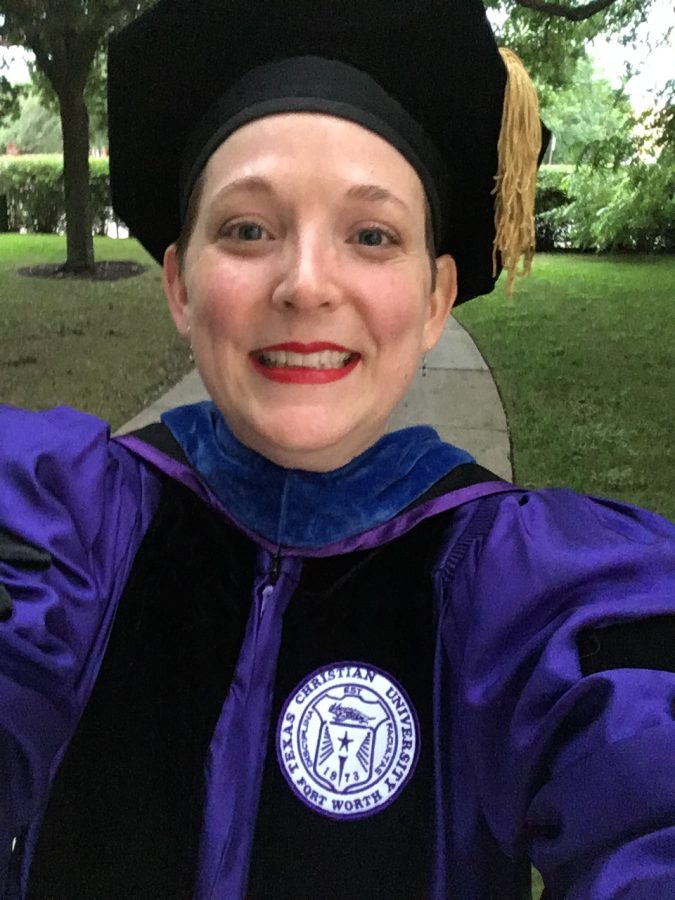Professor Personalities: Writing and Rhetoric professor reflects on Myers-Briggs results
Dr. Ila McCracken takes a selfie in academic dress. Dr. McCracken was revealed to be an ENTJ by her Myers-Briggs personality test.
Young Ila McCracken living in the Texas Panhandle had dreams beyond herself: a greater purpose that rooted her in wanting to change the world. This desire to be of service she felt was due to her small-town childhood, but it was beyond her upbringing and rather her personality that shaped her identity –– the 16 personalities test (MBTI) revealed her as a protagonist (ENFJ).
“Protagonists feel called to serve a greater purpose in life. Thoughtful and idealistic, these personality types strive to have a positive impact on other people and the world around them,” explains the 16 personalities website. “[They’re] born leaders, which explains why these personalities can be found among many notable politicians, coaches, and teachers.”
McCracken, an ENFJ who landed in higher education now teaches Writing and Rhetoric.
“I wasn’t terribly surprised,” McCracken said regarding her results. “I took the Myers Briggs when I was in college, and I took it again recently, like two years ago, and I was an ENTJ. So, the feeling change was interesting for me, just because I didn’t expect to see that, but it’s kind of in line with other personality tests that I’ve done and other work that I’ve done, so I was not terribly surprised at all.”
McCracken felt that much of what the test revealed was true for her.
“Definitely that greater purpose thing, that absolutely still feels true for me,” McCracken said. One of the other personality tests that I have done talks about my personality type as taking kind of, like, larger social, political, systemic issues very personally, and I kind of see that is overlapped with this idea of protagonists having a greater purpose in life [is that] when I see things that aren’t as they should be, or things that could be better, that’s what draws my attention and that has always been the case.”
McCracken who teaches the Senior Project left students with the impression of how passionate she is for her work and what she believes in, but how does she define passion?
“I read a book recently, and it talked about time being our most valuable and renewable resource.” I think for me, that’s where the idea of passion and meaning comes from,” Dr. McCracken said. “It’s that if you’re going to spend your time on something, then if you can, let’s make sure it’s something that you care about and that you want to spend your time on rather than feeling like you’re just supposed to be a cog in a will. I mean, we all are cogs at the end of the day, but if we can have a little bit of passion while we do that, maybe it makes it feel less laborious.”
Dr. McCracken, the protagonist who has this nature to not only find inspiration within but the desire for others to find their own spark is not only perfect to lead seniors in their own paths of discovery but her profession itself seemed to pick her instead of the other way around.
“For somebody who is constantly telling students to choose who they want to be when they grow up, I still don’t know who I’m going to be, and I ended up doing teaching,” Dr. McCracken said. “I don’t want to say by default, but I don’t know that I started on this path intentionally, but the one thing that was intentional was realizing that my happy place is helping people figure out what they want to say or what they want to think. Helping people grow into themselves is absolutely my happy place.”
Dr. McCracken introspects in all aspects of her life and learns more about herself through her own work: “You start doing this work [with MBTI’s] and you start seeing all of these threads and you’re like yeah, I can’t become somebody else like this is who I am, and I have to learn to live with this version.”
She went into detail about one of her tendencies that protagonists tend to have which is believing there’s a right way to do something. “I’m like, why? Why can we just do it this way? Right, not recognizing that there are multiple ways to solve the problem or to get to the right answer, doesn’t always have to be the one path. Which is funny because I now understand why my mother and I were like this my whole life and still are. It comes from a place of good intention.”
She also discussed the downside of her personality type since she said it’s read a particular way in the classroom. “One of the things that I am still wrestling with is whatever the intimidation factor is that comes with me and trying to find ways to disarm that as quickly as possible at the beginning of a term so that students feel confident approaching me and asking questions.”
Having taken the test before and Dr. McCracken seeing her new results, the percentages stood out to her since her intuitive and feeling scores were way higher than she expected –– both being higher than her judging.
“I’ve known for a long time that I get my energy from other people but the intuitive and feelings stood out to me in part because these are areas of growth that I’ve been working on, like trying to figure out what intuition even is, and what it sounds like when it happens in a body,” Dr. McCracken said. “So even looking at 58% just feels super high to me, or that I am more feeling than thinking, in part because I’m an academic, right? So, my whole life has been to think and to have deep thoughts and to always start with those. So the thought that I would be more feeling, and thinking is still a little surprising to me.”
Dr. McCracken revealed a bit more about her work with MBTI’s and framed the test as not a solid thing, but more like tendencies. Since tendencies often change, the pandemic had an influence on her MBTI changing from thinking to feeling.
“I spent a lot of time, especially last year when we were teaching fully online, thinking about how much of my life improved,” Dr. McCracken said. “Then it became clear that we were coming back to campus, I was trying consciously to think about choices I had made when we were teaching fully online that were meant to give students mental space, and trying to try to bake some of those things into my class in a way that I wouldn’t before.”
“[Also] just recognizing that my husband and I, we kept our jobs, we were able to work from home,” Dr. McCracken added. “We don’t have small children, we were able to kind of pot ourselves with our friends, and then watch them struggle and realize, you know thinking about what it would be like to be in your shoes at your age, and the thought of going home to live with my parents in my small town in the Texas Panhandle in my early 20s, absolutely would have broken me so I’m just trying to remember that especially this year, you know, teaching sophomores who spent their whole freshman year at home online who didn’t really get a full college experience and still aren’t, or people in your position who had their last two years of college robbed from them essentially and like knowing that I’m struggling with who am I, what am I doing, is this who I’m supposed to be and then trying to remember that you guys are having all of those same conversations. So absolutely.”
Dr. McCracken’s personality shifting from thinking to feeling also impacted how she viewed a professor’s main objective.
“If I didn’t learn anything else in COVID it’s that you can’t just push everything else to the side and do the work. You can but there’s a cost to that and you can only do that for so long… [So] recognizing that getting to the other side of all of this is only important, meaning getting you to graduation is only good if we can get all of you there,” Dr. McCracken said.“If we can just get your brain there, then what’s the point? Like if you’re a broken shell of a person who doesn’t want to leave your room when it’s all over with then we have failed you.”
The 16 personalities test also reveals “the dark side of your personality type” and for an ENFJ that means “the nagging fear that you might not reach your full potential and make the most of your one wild and precious life.” Dr. McCracken feeling like it hit right at home:
“I don’t have it all figured out, and I constantly tried to tell my students that because I think I think it’s sometimes you look at your faculty members and you think they know all the answers and we don’t we’re just people like you guys trying to learn and do better and know more.”
Dr. McCracken, a writing and rhetoric professor, protagonist, and lifelong learner who’s currently doing her own work with MBTI’s.
“I’m super interested in these because I think I think we all like to think we have ourselves figured out and the personality test is just a way to help us understand who we are when we’re not maybe as metacognitive or as mindful as we want to be,” said Dr. McCracken. “And so being able to see it and kind of know where potential problems are going to lie so that we can make change, and just be a better human with other humans. That’s my goal right now. Just to try and be a human.”
Just like a natural-born leader would say.
Check out other St. Edward’s faculty and staff’s Myer-Briggs types here.







